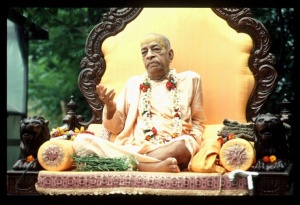CC Madhya 2.11 (1975): Difference between revisions
(Vanibot #0027: CCMirror - Mirror CC's 1996 edition to form a basis for 1975) |
(Vanibot #0020: VersionCompareLinker - added a link to the Version Compare feature) |
||
| Line 2: | Line 2: | ||
<div style="float:left">'''[[Sri Caitanya-caritamrta (1975)|Śrī Caitanya-caritāmṛta (1975)]] - [[CC Madhya (1975)|Madhya-līlā]] - [[CC Madhya 2 (1975)|Chapter 2: The Ecstatic Manifestations of Lord Śrī Caitanya Mahāprabhu]]'''</div> | <div style="float:left">'''[[Sri Caitanya-caritamrta (1975)|Śrī Caitanya-caritāmṛta (1975)]] - [[CC Madhya (1975)|Madhya-līlā]] - [[CC Madhya 2 (1975)|Chapter 2: The Ecstatic Manifestations of Lord Śrī Caitanya Mahāprabhu]]'''</div> | ||
<div style="float:right">[[File:Go-previous.png|link=CC Madhya 2.10 (1975)|Madhya-līlā 2.10]] '''[[CC Madhya 2.10 (1975)|Madhya-līlā 2.10]] - [[CC Madhya 2.12 (1975)|Madhya-līlā 2.12]]''' [[File:Go-next.png|link=CC Madhya 2.12 (1975)|Madhya-līlā 2.12]]</div> | <div style="float:right">[[File:Go-previous.png|link=CC Madhya 2.10 (1975)|Madhya-līlā 2.10]] '''[[CC Madhya 2.10 (1975)|Madhya-līlā 2.10]] - [[CC Madhya 2.12 (1975)|Madhya-līlā 2.12]]''' [[File:Go-next.png|link=CC Madhya 2.12 (1975)|Madhya-līlā 2.12]]</div> | ||
{{CompareVersions|CC|Madhya 2.11|CC 1975|CC 1996}} | |||
{{RandomImage}} | {{RandomImage}} | ||
==== TEXT 11 ==== | ==== TEXT 11 ==== | ||
| Line 32: | Line 31: | ||
<div class="purport"> | <div class="purport"> | ||
The ecstatic transformations of the body described in such exalted | The ecstatic transformations of the body as described in such exalted scriptures as the Bhakti-rasāmṛta-sindhu are practically not seen in this material world. However, these symptoms were perfectly present in the body of Śrī Caitanya Mahāprabhu. These symptoms are indicative of mahābhāva, or the highest ecstasy. Sometimes sahajiyās artificially imitate these symptoms, but experienced devotees reject them immediately. The author admits herein that these symptoms are not to be found anywhere but in the body of Śrī Caitanya Mahāprabhu. | ||
</div> | </div> | ||
Latest revision as of 12:19, 27 January 2020

A.C. Bhaktivedanta Swami Prabhupada
TEXT 11
- kāhāṅ nāhi śuni yei bhāvera vikāra
- sei bhāva haya prabhura śarīre pracāra
SYNONYMS
kāhāṅ—anywhere; nāhi—not; śuni—we hear; yei—that; bhāvera—of ecstasy; vikāra—transformation; sei—that; bhāva—ecstasy; haya—is; prabhura—of the Lord; śarīre—in the body; pracāra—manifest.
TRANSLATION
The extraordinary transformations of the body due to transcendental feelings would never have been possible for anyone but the Lord, in whose body all transformations were manifest.
PURPORT
The ecstatic transformations of the body as described in such exalted scriptures as the Bhakti-rasāmṛta-sindhu are practically not seen in this material world. However, these symptoms were perfectly present in the body of Śrī Caitanya Mahāprabhu. These symptoms are indicative of mahābhāva, or the highest ecstasy. Sometimes sahajiyās artificially imitate these symptoms, but experienced devotees reject them immediately. The author admits herein that these symptoms are not to be found anywhere but in the body of Śrī Caitanya Mahāprabhu.